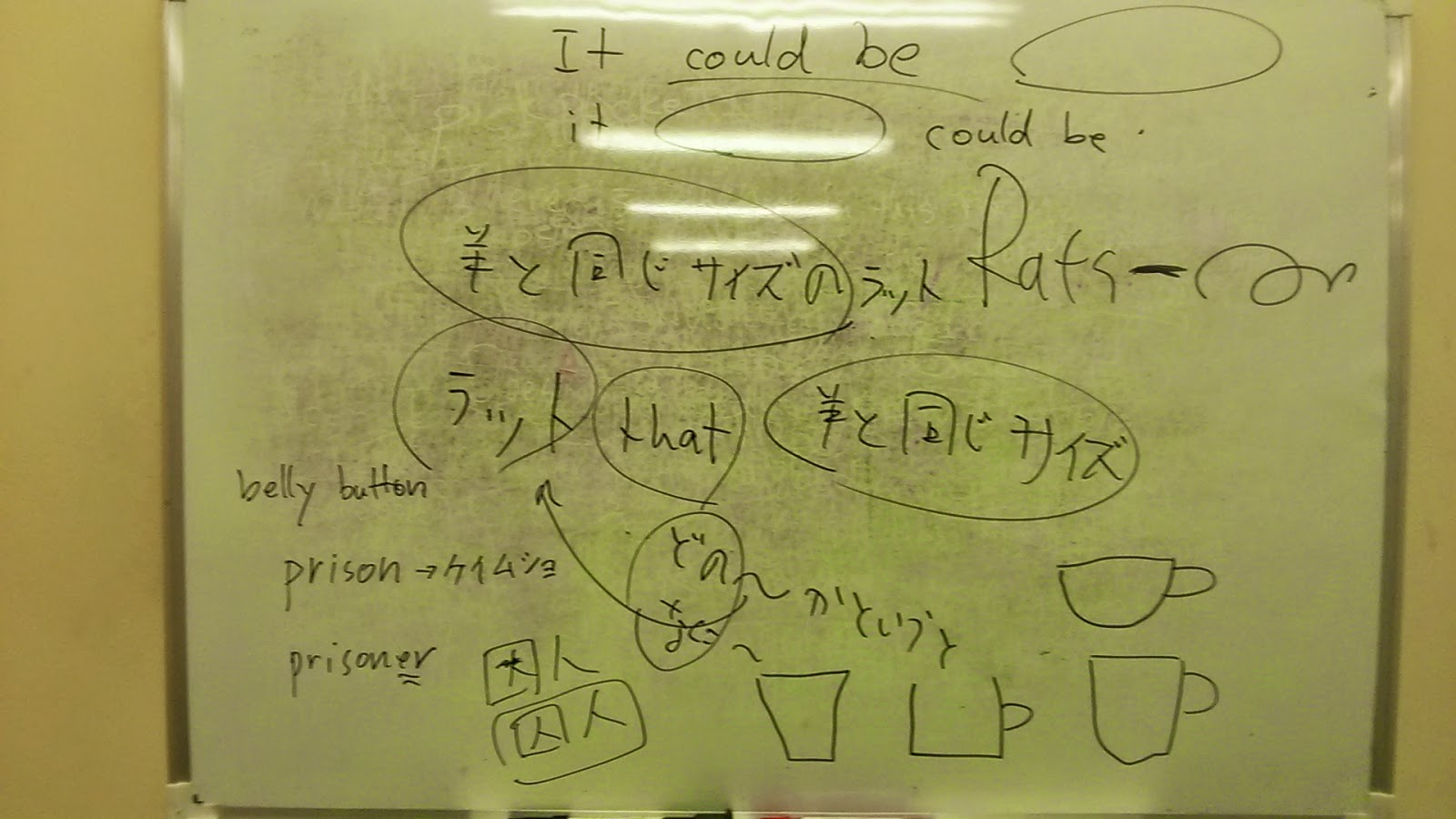生徒さんたちが英語の先生に授業中、日本語を教えました。
英語で日本語を教えるってむずかしいですよね。
Students taught Japanese to their English teacher during a class.
It is difficult to teach Japanese in English, isn't it?
2014年3月25日火曜日
2014年3月18日火曜日
2014.03.18 送別会
生徒さんが1人、英語を勉強しにオーストラリアに行きます。
先週、彼女の送別会をしました。
彼女はアップスロープでとても一生懸命英語を勉強しました。
毎回、習った事を復習し、先生に質問をよくしていました。
オーストラリアで充実した生活を送ってほしいです!
One student at our language school is going to Australia to study English.
We held her farewell party last week.
She studied English so hard at UP-SLOPE.
She reviewed what she learned every time and she often asked some questions her English teacher.
We hope she has a fulfilling life in Australia!
先週、彼女の送別会をしました。
彼女はアップスロープでとても一生懸命英語を勉強しました。
毎回、習った事を復習し、先生に質問をよくしていました。
オーストラリアで充実した生活を送ってほしいです!
One student at our language school is going to Australia to study English.
We held her farewell party last week.
She studied English so hard at UP-SLOPE.
She reviewed what she learned every time and she often asked some questions her English teacher.
We hope she has a fulfilling life in Australia!
2014年3月11日火曜日
2014.03.11 日本語は難しいけど、英語は簡単!
日本語を勉強しているある人が「日本語は難しいけど、英語は簡単!」と言ってました。
皆さん、どうしてだか分かりますか。
put on(着る)を日本語に訳す時、何をput onするかによって適切に訳を変える必要があります。
例)上着を着て!
ex)Put on your jacket!
例)手袋をはめて! 手袋をして!
ex)Put on your gloves!
例)このメニューに書かれている字が小さすぎて眼鏡をかける必要があります。
ex)This writing on this menu is really small, I need to put on my glasses.
例)割れたグラスの破片がたくさんあるからスリッパを履いて。
ex)Put on your slippers because there are many fragments of broken glass.
日本人はこの訳し方の違いを自然と学びますが、(外国人の)日本語学習者にとってこのことをマスターすることは難しいと思います。
Someone who studies Japanese said " Japanese is difficult but English is simple!"
Do you know why?
When you translate "put on" into Japanese, you need to change the translation properly depending on what you "put on."
例)上着を着て!
ex)Put on your jacket!
例)手袋をはめて! 手袋をして!
ex)Put on your gloves!
例)このメニューに書かれている字が小さすぎて眼鏡をかける必要があります。
ex)This writing on this menu is really small, I need to put on my glasses.
例)割れたグラスの破片がたくさんあるからスリッパを履いて。
ex)Put on your slippers because there are many fragments of broken glass.
Japanese learn the different translations naturally, but I think it is difficult for Japanese learners to learn that.
皆さん、どうしてだか分かりますか。
put on(着る)を日本語に訳す時、何をput onするかによって適切に訳を変える必要があります。
例)上着を着て!
ex)Put on your jacket!
例)手袋をはめて! 手袋をして!
ex)Put on your gloves!
例)このメニューに書かれている字が小さすぎて眼鏡をかける必要があります。
ex)This writing on this menu is really small, I need to put on my glasses.
例)割れたグラスの破片がたくさんあるからスリッパを履いて。
ex)Put on your slippers because there are many fragments of broken glass.
Someone who studies Japanese said " Japanese is difficult but English is simple!"
Do you know why?
When you translate "put on" into Japanese, you need to change the translation properly depending on what you "put on."
例)上着を着て!
ex)Put on your jacket!
例)手袋をはめて! 手袋をして!
ex)Put on your gloves!
例)このメニューに書かれている字が小さすぎて眼鏡をかける必要があります。
ex)This writing on this menu is really small, I need to put on my glasses.
例)割れたグラスの破片がたくさんあるからスリッパを履いて。
ex)Put on your slippers because there are many fragments of broken glass.
Japanese learn the different translations naturally, but I think it is difficult for Japanese learners to learn that.
2014年3月4日火曜日
2014.03.04 断捨離
「断シャリ」がアップスロープで流行っています。
生徒さんたちが要らない物をアップスロープに持ってきます。
サングラスや服、雑誌、万歩計、電子辞書などなど…
「ご自由にどうぞ」と書いて、断シャリコーナを作りました。
無料でこの中から好きな物を持っていく事ができます。
生徒さんの1人は海苔をたくさん持ってきました。
ある英語の先生はその海苔を気に入って休憩ごとに食べていました。
“Decluttering"is getting popular in our language school.
Some of the students bring some things that they don't need any more to our language school.
Sunglasses, clothes, magazines, pedometers, electronic dictionaries etc...
We made a decluttering booth and sign on which is written "TAKE ONE."
You can take anything you want with you for free.
One of the students brought a lot of dried laver seaweed.
An English teacher loved it and he eats it every break.
生徒さんたちが要らない物をアップスロープに持ってきます。
サングラスや服、雑誌、万歩計、電子辞書などなど…
「ご自由にどうぞ」と書いて、断シャリコーナを作りました。
無料でこの中から好きな物を持っていく事ができます。
生徒さんの1人は海苔をたくさん持ってきました。
ある英語の先生はその海苔を気に入って休憩ごとに食べていました。
“Decluttering"is getting popular in our language school.
Some of the students bring some things that they don't need any more to our language school.
Sunglasses, clothes, magazines, pedometers, electronic dictionaries etc...
We made a decluttering booth and sign on which is written "TAKE ONE."
You can take anything you want with you for free.
One of the students brought a lot of dried laver seaweed.
An English teacher loved it and he eats it every break.
登録:
投稿 (Atom)




.jpeg)